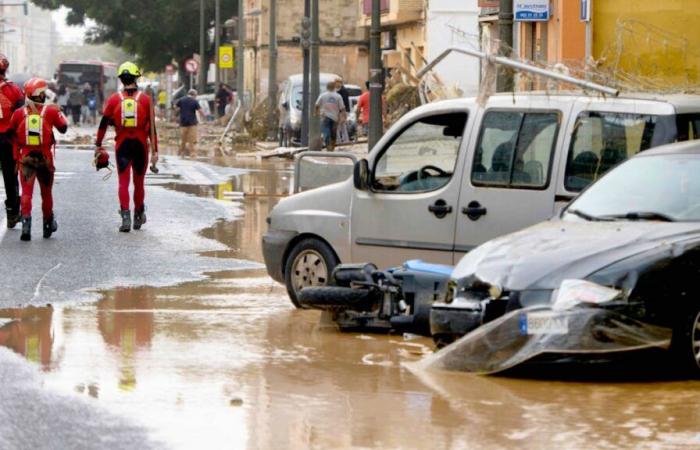Almost a week after the explosion of anger which targeted Prime Minister Pedro Sánchez, the head of the regional executive Carlos Mazón and the sovereigns Felipe VI and Letizia in Paiporta, demonstrations are planned for late Saturday in Valencia and in other Spanish cities to protest against the management of the floods of October 29.
“I find that everything that happened is regrettable, from the alert that was never issued, to the management that took place subsequently, absolutely no one came,” laments Manuel Gayá , a 40-year-old engineer who lives in Llocnou de la Corona, near Valencia: “We were completely blocked for four days, cleaning the streets, the houses, helping each other.”
“Solo el pueblo salva el pueblo” (Only the people save the people, editor’s note): in Valencia, this slogan became popular in conversations after the spontaneous wave of solidarity which was organized to compensate for the supposed errors of the authorities.
On Saturday, the organizers of the Valencia rally will march to demand the resignation of Carlos Mazón, who concentrates on his person a large part of the anger of the victims, and had been targeted on Sunday in Paiporta, like the head of government and the sovereigns, by insults and mud throwing: unprecedented images illustrating the exasperation in the devastated areas. Figure of the People’s Party (PP, right), this 50-year-old lawyer is accused of having been slow to react then that the Spanish Meteorological Agency (Aemet) had issued a red alert on the morning of October 29.
He is also accused of having been absent for several hours when it was already starting to rain and the emergency committee had met. Carlos Mazón defended himself by assuring that he was participating in “a working lunch” in a restaurant in Valencia, with a journalist, according to Spanish media. Among the accusations also made by the victims, the fact that the entire population was only alerted via their mobile phones in the evening, when many areas were already submerged. The region’s main emergency manager, Salomé Pradas, admitted on Thursday that she was unaware of the existence of this alert system, before retracting her statement.
In Spain, a very decentralized country, disaster management is indeed the responsibility of regional administrations, but the central government, responsible for issuing alerts via Aemet, can provide resources and even take control. in extreme cases. It is precisely this last point which motivates the criticism of the right-wing opposition, which accuses the head of the socialist government of having allowed the region to sink through political calculations instead of regaining control. Pedro Sánchez acted “in bad faith”, criticized Miguel Tellado, the PP spokesperson in parliament. Sources close to the government assure for their part that they want to define in due time the possible responsibilities of each person and the possible failures in the management of the disaster, while affirming that the government has done everything it could do within the current institutional framework. .
But for the socialist mayor of Alaquas Toni Saura, “the coordination between the administrations was chaotic”, according to comments reported in the Valencian daily Levante. “It’s a national shame,” says comedian López-Guitián, originally from Valencia. Returning from a cleaning operation, the comedian known in Spain as Tonino castigates “an abandonment of post by all institutions, because they should have functioned and not think that someone else would do it at their place.”






